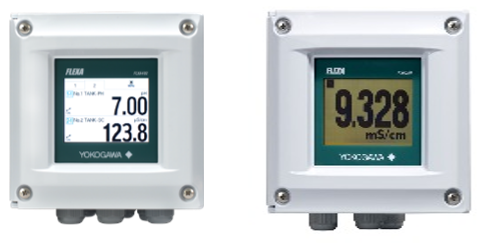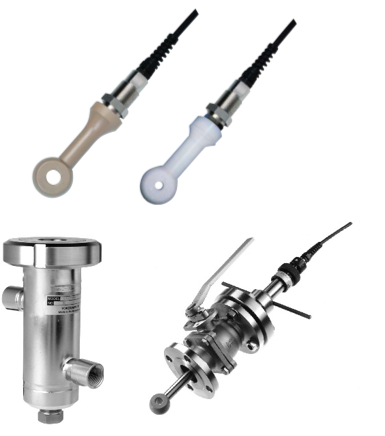Introduction
The kraft process, also known as kraft pulping or the sulfate process, is a technology for conversion of wood into wood pulp that consists of almost pure cellulose fibers. Today, the kraft process is used in approximately 80% of paper production.

In the process, wood chips are digested at elevated pressure and temperature by harsh chemicals known as “white liquor." White liquor is a water solution of sodium sulfide and sodium hydroxide. The lignin that binds the cellulose fibers together in the wood is chemically dissolved by the white liquor.
The industry uses the Kappa number to estimate the amount of bleaching chemical, a potassium permanganate solution, that is required to extract the lignin and obtain a pulp with the desired degree of brightness. The Kappa number indicates the lignin content, or “bleachability” of the pulp.
The Kappa number can be used to monitor the effectiveness of the lignin-extraction phase of the pulping process. Measuring conductivity in the recirculation zone of a continuous digester provides feedback to the control system to reduce the variability in the Kappa number of the product pulp. This enables more efficient chemical use and higher quality pulp
Process
The kraft process is cyclical and self-sustaining. Wood chips are fed into a digester where they react with the cooking liquors, a combination of white liquor and black liquor. Black liquor is a byproduct of the process within the digester. It is the spent cooking liquor that is a combination of the removed lignin, water, and chemicals used in the extraction process. The inorganic portion of the black liquor, white liquor, is the regenerated mixture of sodium hydroxide and sodium sulfide that is the product of a multi-step recovery process. As output from the recovery process, the white liquor feeds into the digester to react with a continuous feed of wood chips.
The wood chips remain in the digester for several hours at 130 to 180ºC to allow for the maximum possible delignification. Under these conditions, lignin and some hemicellulose degrade into fragments that are soluble in the strongly basic liquid. The remaining solid pulp is collected and washed. This stock is brown in color and is known as “brown stock.” The material proceeds further into the manufacturing process to be bleached and become the end product.
While the wood chips reside in the digester, the sodium hydroxide and sodium sulfide are consumed by the acetic and lignin components in the wood chips. To make sure that the white liquor is not completely consumed, a conductivity value can be measured and correlated with an acceptable Kappa number range. This allows the feed rate of the white liquor to the digester to be adjusted and maintained at a certain conductivity value throughout the digestion process
Product Recommendations
 Yokogawa recommends the ISC40 Inductive Conductivity Sensor for measurement of the alkali concentration in black liquor because the sensor has proven to be rugged and reliable with a minimum of maintenance required. The Yokogawa ISC40G sensor is available in two chemical resistant materials, PEEK and Teflon, along with a variety of process connection capabilities. This allows a great deal of installation flexibility including threaded, flanged and flow through connections.
Yokogawa recommends the ISC40 Inductive Conductivity Sensor for measurement of the alkali concentration in black liquor because the sensor has proven to be rugged and reliable with a minimum of maintenance required. The Yokogawa ISC40G sensor is available in two chemical resistant materials, PEEK and Teflon, along with a variety of process connection capabilities. This allows a great deal of installation flexibility including threaded, flanged and flow through connections.
The Yokogawa FLXA series transmitter is housed in a robust, cast aluminum case with chemically resistant coating. The cover features a flexible polycarbonate window. The transmitter is ideal for mounting directly on-site, even under harsh environmental conditions.
 Conductivity Measurement System:
Conductivity Measurement System:
Process Liquid Analyzer:
2-wire FLXA202 Contacting Conductivity Analyzer
4-wire FLXA402 Contacting Conductivity Analyzer
Sensor Selection:
ISC40FS/ISC40FF Insertion of Flow-thru assembly
ISC40PR Retractable assembly
ISC40G General Purpose Sensor
ISC40S Intrinsically Safe Sensor
Industrias
-
Papel y pulpa
La industria del papel y la pulpa es altamente competitiva y debe satisfacer necesidades del mercado que están en constante cambio. Yokogawa ayuda a poner en operación plantas eficientes en el consumo de energía que son sostenibles globalmente.
Productos y Soluciones Relacionadas
-
2-Wire Transmitter/Analyzer FLXA21
The FLEXA™ series analyzers are used for continuous on-line measurements in industrial installations. With an option for single or dual sensor measurement, they are the most flexible two-wire analyzer available.
-
Multi Channel 4-Wire Analyzer FLXA402
Available in single or multi-sensor measurement
-
Toroidal/Inductive Conductivity Sensor ISC40
Superior conductivity measurement reliability, accuracy, and rangeability
-
Conductivity Analyzers
Maintain and control even the most demanding process applications
-
Conductivity Sensors
Measure aqueous solutions quickly and reliably
¿Tiene Dudas?
Contacte a un Experto de Yokogawa y conozca como podemos ayudarle a resolver sus retos.